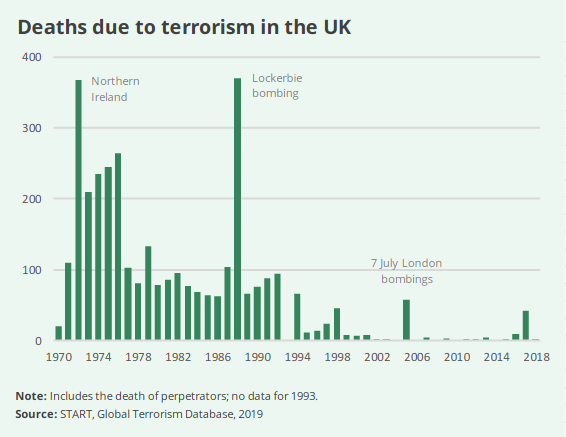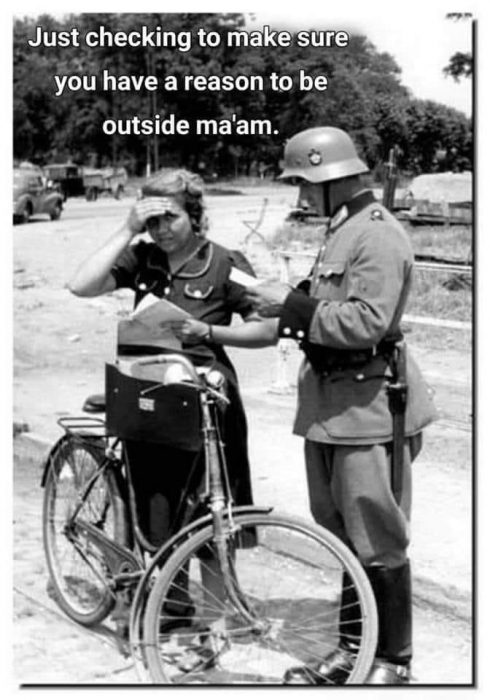I guess I should say something about 9/11, other than what I’ve said previously about being at work that day and trying to find out where my daughter was on the last day of her New York stay (when she’d hinted she might visit the WTC as she was staying a block or two away); and about how to me it was a prophetic marker on the forthcoming judgement on Western nations, now come home to roost.
Instead I will focus on just one issue that came out of it, and the consequent “War on Terrorism,” and that is the failed attempt to introduce compulsory identity cards in this country in order to prevent an accelerating spiral of terrorist violence.
It is partly because memories are so short that we fail to read the signs of our own times, and I’m confident that most of us Brits have forgotten just what a hot issue this was at the time, both in public and in parliament. At least, that seems to be the case judging by the alleged high public support for vaccine passports, despite multiple ministers previously denouncing them as un-English and not-going-to-happen, and even as the press drip-feeds us their predictable mission creep from foreign travel, to big sports and entertainment venues, to pubs to… well, nobody official is trying to pretend that the example of France in making them mandatory, even for shops, will not happen here. And even in the MSM rumours have occasionally crept through about universal digital identity and its role in a social credit system.
Without even looking it up I can remember how, post-9/11, the Home Secretary of the day, David Blunkett, backed by the cabinet, insisted that the only effective way to prevent mass-deaths from terrorism was to introduce (temporarily of course) an identity card system. He was supported by a former head of MI5, two former heads of the Metropolitan Police, and the Association of Chief Police Officers (active Intelligence Chiefs and Commissioners of the Met didn’t air public views back then, but were said to be in absolute need of the scheme).
Blunkett had introduced the idea soon after 9/11 as “Entitlement Cards” (note the similar use of the language of “rights” to mask “control” as in the ID2020 literature). Back in 1996 a similar proposal by the Conservative Government had been ridiculed by Tony Blair as an illiberal “Tory Right” waste of money. His 2003 Bill was passed by the large Labour majority, whilst the Conservatives, though mostly supportive, abstained. But that Bill timed out in the House of Lords.
A reintroduced Bill after the 2005 election was opposed by the Conservatives, on grounds including lack of effectiveness, cost and civil liberties, and the Bill was harried in the Lords so that – crucially – registration was made voluntary rather than compulsory. It crept through on Party lines, though 13 Labour MPS and all the minor parties, as well as the Conservatives, voted against.
The net result was the registration of foreign nationals on the database, and passport-holders as and when they renewed, and no more than a few thousand voluntary registrations.
The public was as fickle as ever: in 2003 the memory of 9/11 put 61% in favour and 39% against, but by July 2006 51% were against, and 78% unhappy that their data should be recorded on a central database. Only 11% trusted the government to keep their data confidential. Remember that this was before social media, Edward Snowden’s whistleblowing and the knowledge of globalist agendas within government. Public confidence was not helped when HMRC lost 25 million records in 2007.
When the Conservative-LibDem coalition came to power in 2010, they repealed the Identity Card Bill and in February 2011 destroyed the entire register. So that was the end of that.
The big question, then, is what profoundly damage to National Security the effectively failed roll out of Identity Cards produced. Can MI5 and the Police Chiefs now say, “We told you they were necessary?” This graphic, from an official reference, tells the tale:
You can see that the whole period since 9/11 has seen a massive reduction in terrorism compared to the previous decades, in large part because of the peace agreement in Northern Ireland. From 2000 up to 2020, there have been only 139 terrorism-related deaths in Britain, and that includes the deaths of terrorists themselves. That is about the same number as road deaths in London alone for a single year. The vast majority (99) occurred in two years: 2005 in the London 7/7 bombings, and the cluster of 2017 attacks on Westminster Bridge, London Bridge and the Manchester Arena. Many of the perpetrators were already known to the police but not actively under surveillance, and it is hard to see that carrying identity cards would have prevented the most serious attacks, or indeed many of the others.
Ceratainly it is likely that the efforts of police and intelligence services have prevented many attacks – but they did so, despite all the expert, parliamentary and public opinion, without the need for compulsory Identity Cards.
Add a little pandemic fear (or is it pressure from those seeking a new world order of digital identities?) and suddenly all the Conservative and public opposition to central identity records has disappeared. Perhaps it is because we now have Presidential Rule by Decree, with very little parliamentary scrutiny, a whipping system that seems to have reduced every MP to abject servility, and an apparent absence of scrutiny by the Lords. Having given Royal Assent to the Coronavirus Act back in 2020, as far as I can see even the Queen does not need to approve all the new laws, including vaccine passports under the emergency powers.
Or perhaps it is also because we have forgotten that despite all the previous insistence that Identity Cards were an absolute necessity to prevent terrorist and criminal mayhem, they turned out to be totally unnecessary. I don’t really need to rehearse that, since vaccines don’t prevent transmission of COVID and may exacerbate it because of increase viral loads, vaccine passports are even more predictably useless for their stated purpose than were the cards. All that leaves is a compulsory centralised state record – and probably a centralised international record, of all of us. As Wikipedia records of the 2006 Act:
The Act specified fifty categories of information that the National Identity Register could hold on each citizen, including up to 10 fingerprints, digitised facial scan and iris scan, current and past British and overseas places of residence of all residents of the UK throughout their lives and indexes to other Government databases (including National Insurance Number) – which would allow them to be connected. The legislation on this resident register also said that any further information could be added.
Now, of course, the record would include our medical records, and potentially (and easily, given the information gathered from social media by the government) our financial dealings and our entire web and mobile-phone history. What it is unlikely to do is to limit the spread of COVID, simply because the vaccines don’t. It is interesting to read the WHO’s “vaccine passport handbook” admitting that “vaccine records alone” are insufficient. All that extra information will surely be needed to flatten the curve, and will be correlated using AI to decide who is eligible to travel or go into Sainsburys. These issues will certainly be known to government, since they were in the past:
During a private seminar for the Fabian Society in August 2005, Tony McNulty, the minister in charge of the scheme, stated “perhaps in the past the government, in its enthusiasm, oversold the advantages of identity cards”, and that they “did suggest, or at least implied, that they might well be a panacea for identity fraud, for benefit fraud, terrorism, entitlement and access to public services”. He suggested that they should be seen as “a gold standard in proving your identity”.
Papers, please!



Stop Press
It appears Boris is to decide not to roll out vaccine passports, and that this has been confirmed by the Health Secretary. We’ll believe it when we see it (neither logic, principle nor truth have been evident in government policy so far), but were it to become official, it would indicate a significant break between the vaccine passport agenda and the digital identity agenda so closely linked to it through ID2020 and the Good Health Pass Initiative set up that group.
What that significance would be is anybody’s guess. The link is truly a conspiracy theory and Boris keeps on saying “Build Back Better” purely coincidentally? Boris the bold rebel against the globalists? Boris the cowardly seeker of public approval seeing what’s being said against passports? Or Boris the cynic waiting for the first winter surge in infections to introduce them reluctantly anyway?
Stop Stop Press
And now Downing Street clarifies that vaccine passports may be on again if hospital admissions go up (and what an odd winter it would be if they didn’t). So it turns out (within 24 hours) that the original announcement was “Boris the cynic waiting for the first winter surge in infections to introduce them reluctantly anyway.” The Great Reset is still on target after all.